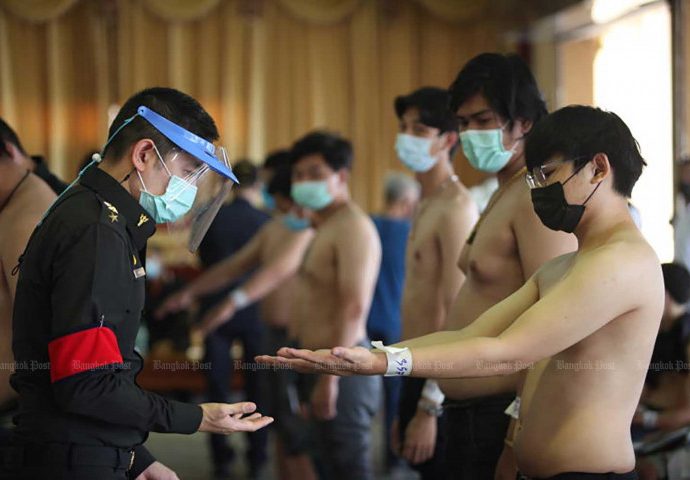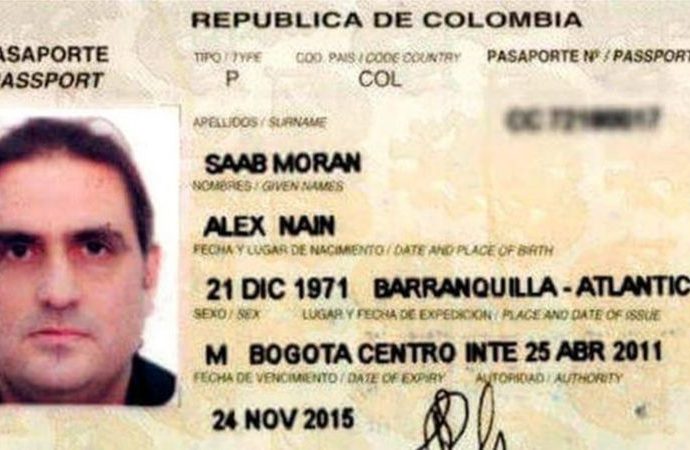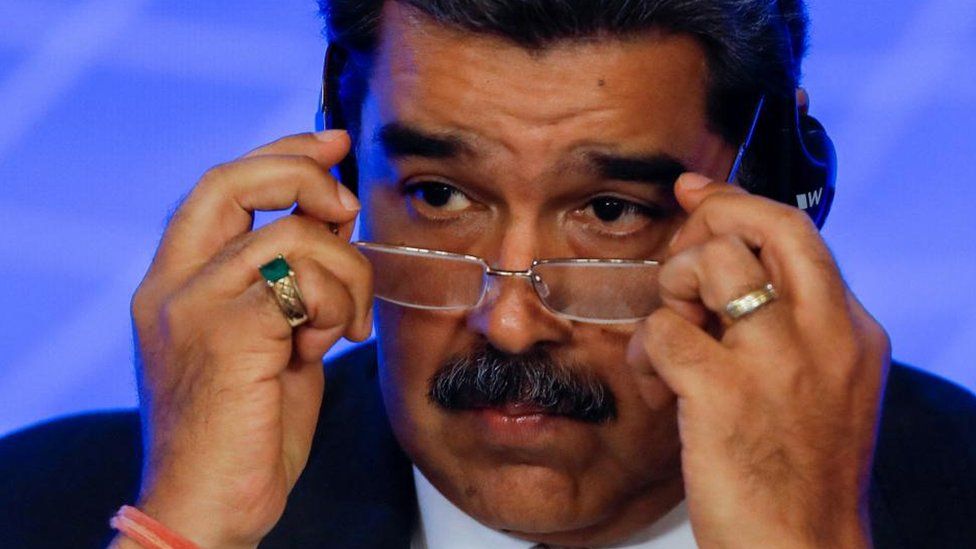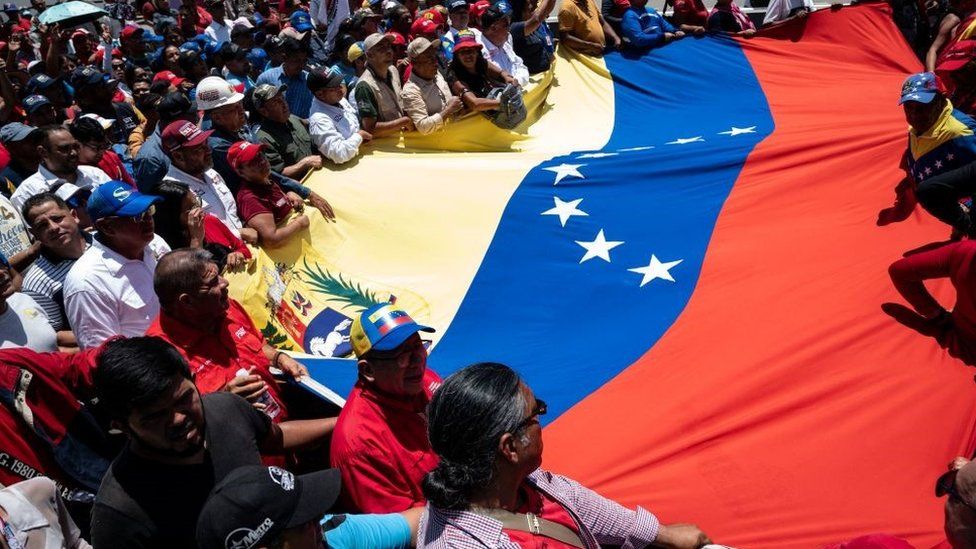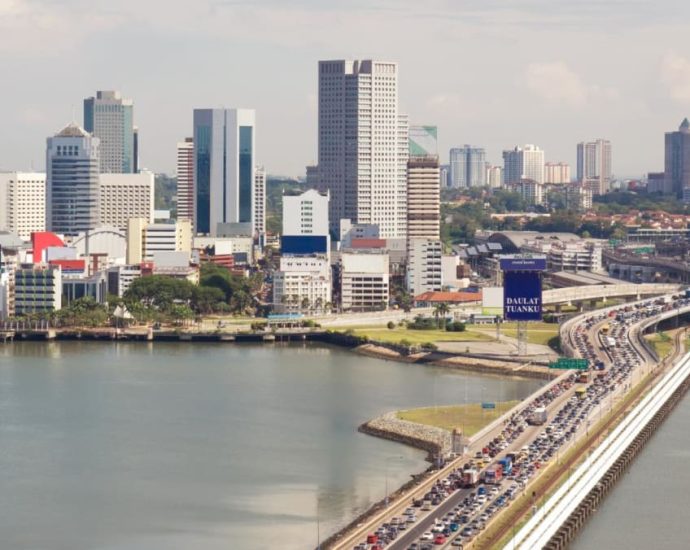Taiwan accuses China of economic coercion after tariff cut removals
TAIPEI: Taiwan on Thursday (Dec 21) accused China of “typical economic coercion” after Beijing announced the end of tariff cuts on some chemical imports from the island – saying Taipei violated a trade agreement – just ahead of Taiwanese elections next month. Taiwan’s Jan 13 presidential and parliamentary elections areContinue Reading
Temu shoppers risk buying items made by forced labour, MP warns
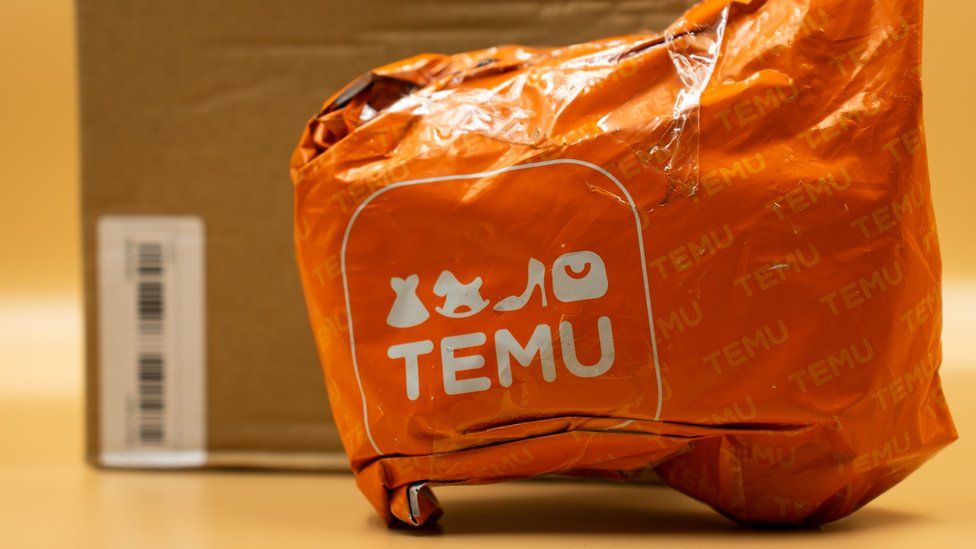 Getty Images
Getty ImagesChristmas shoppers ordering cheap gifts from Temu risk buying items made using forced labour, an MP has warned.
The Chinese app, popular for its huge range of clothing, toys and gadgets at ultra low prices, was downloaded 19 million times in the UK in 2023.
But Alicia Kearns, head of the foreign affairs select committee, told the BBC she’d “long been concerned about the rise of Temu and the risks it poses”.
Temu said it “strictly prohibits” the use of forced, penal, or child labour.
The warning comes after a US government investigation found an “extremely high risk” that products sold on Temu could have been made with forced labour.
The Senate Committee reported the only measure Temu took to ensure this did not happen was to insist that suppliers agree to terms and conditions that prohibit the use of forced labour.
‘Shop like a billionaire’
Temu is backed by Chinese e-commerce giant Pinduoduo and launched in the US in 2022.
Since its UK launch earlier in 2023, Temu’s has regularly topped app download charts. The app has 9 million monthly users according to figures given to the BBC by data analyst Sensor Tower.
The online marketplace with the slogan “shop like a billionaire” allows consumers to buy directly from Chinese manufacturers at rock-bottom prices.
It told the BBC by offering more affordable options for everyday items, it had helped “numerous families mitigate the impact of rising living costs”.
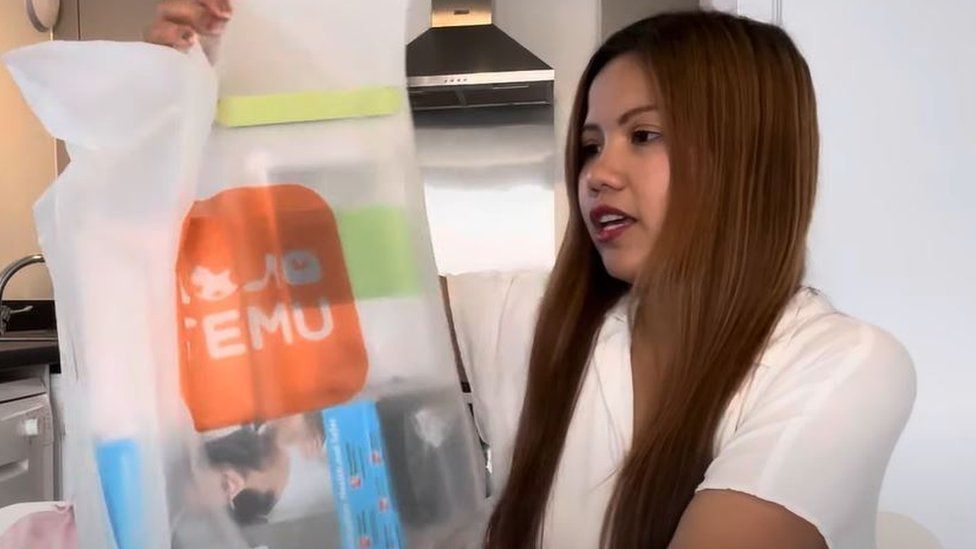
Single mum Rina agrees. She started using Temu after watching unboxing videos of people opening packages online.
The 32-year-old, who lives in Bedfordshire with her four-year-old son, says shopping on the Chinese marketplace has helped her save money to pay her rent and bills.
“Sometimes I feel guilty, you know, but I need to prioritise myself first… I don’t like when my son would ask me for something. I want to have some money to buy it,” Rina explains.
She says this Christmas she has spent £100 on gifts, compared with the years before Temu when she spent between £200 and £300.
“As a single mom, I need to be looking for a bargain. It’s scary at first, but it’s just so cheap. So I just disregard the bad things”.
Rina vlogs her shopping on Youtube, and says she was approached by Temu and offered £100 to do an unboxing video.
‘Inundated with adverts’
The company has spent millions on marketing, including brand partnerships with online influencers, social media adverts and even a 30-second advert at this year’s Super Bowl – the price of a prime tv slot like this has been known to be as high as $5m (£3.8m).
Temu’s online search presence is huge – with items from the site consistently appearing in the top results when shoppers use a search engine to look for an item.
Alicia Kearns MP has been one of those “inundated” with Temu adverts, telling the BBC “it’s been difficult to get away from them”.
She is calling for greater scrutiny of the online marketplace to make sure “consumers are not inadvertently contributing to the Uyghur genocide”.
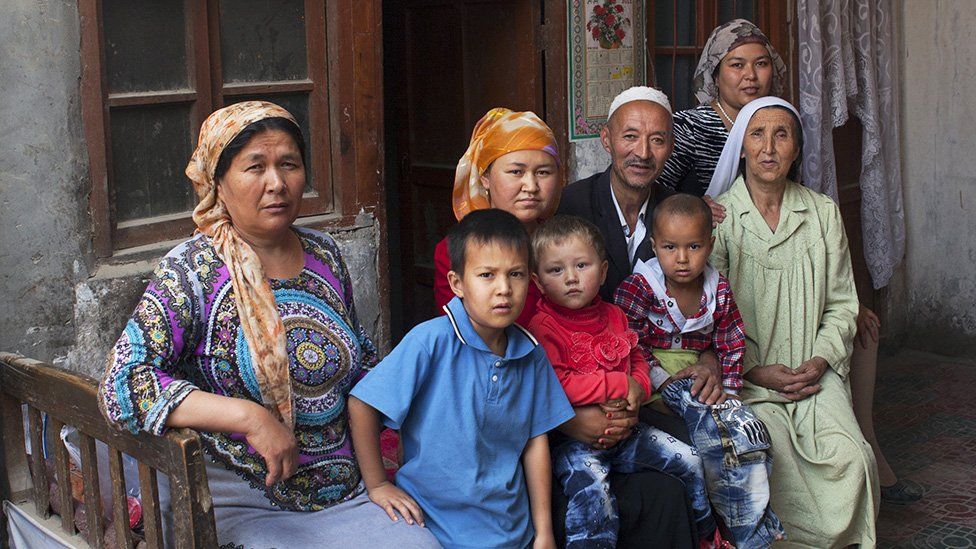
China has been accused of detaining more than one million Uyghurs in Xinjiang against their will over the past few years.
The region produces about a fifth of the world’s cotton and human rights groups have voiced concerns that much of that cotton export is picked by forced labour. China denies all allegations of human rights abuses in Xinjiang.
But speaking about a lack of transparency around its supply chains, Ms Kearns warned the reality of cheaper prices could come from a “reliance on slave labour”.
“When you look into where Temu gets its goods from, where in China it is producing them, you can see that these are areas where we know that there is the use of force Uyghur slave labour,” said Ms Kearns.
“My request to Temu would be show us your supply chain. Show us that you are not using Uyghur slave labour,” she urged.
‘Slave labour’
Ms Kearns’ comments have been echoed by leading anti-slavery charities in the UK.
Chloe Cranston from Anti-Slavery called on Temu to provide “full transparency on its supply chain,” while the chairman of Unseen, Andrew Wallis OBE, said “It is imperative consumers, but also governments, know the circumstances and the situations in which goods are manufactured and brought to market.
“The question consumers need to ask themselves is, these are goods that are in essence made by slaves? Is that the kind of gift you want to give at Christmas?”
Temu told the BBC anyone doing business with it must “comply with all regulatory standards and compliance requirements”.
“Employment by all our merchants and suppliers must be voluntary. We explicitly reserve the right to terminate any business relationship if a third party violates our platform’s Code of Conduct or the law,” the spokesperson added.
-
-
24 May 2022
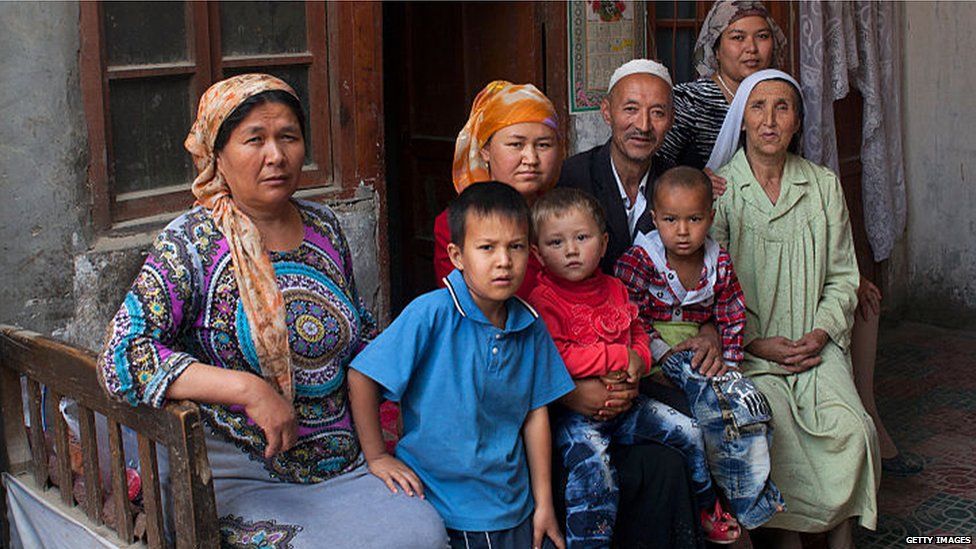
-
Will eating a lot of boozy Christmas food affect your breathalyser test results?

You’re likely to be welcomed with an eggnog when you arrive at a Christmas party. You accept it because it’s just one drink and these things are simply a concoction of egg yolks, sugar and just a smidge of brandy – practically a dessert, right?
But wait, you haven’t factored in that slice of bourbon-soaked fruit cake, rum-laced tiramisu, Bailey-infused trifle and rum truffles yet. Yes, they are boozy but they are also small bites, you figured. Surely, not everything alcoholic adds up and affects your breathalyser test results if you get behind the wheel?
You might be right, said doctors such as National University Hospital’s Dr Lee Guan Huei, who is the head and a senior consultant with Division of Gastroenterology and Hepatology, Department of Medicine. “The amount of alcohol in such alcohol-infused treats is very small and would not add much to breathalyser results or impair driving.”
Buri Ram man heads back to Israel for work
Family asks for Hamas to return their son
PUBLISHED : 21 Dec 2023 at 06:05

A Buri Ram man has returned to work on a farm in Israel despite the ongoing conflict, in a bid to earn more income for his family.
Tom Prongjit, 33, had returned to Thailand during the Thai government’s repatriation campaign that brought back thousands of Thai workers from Israel.
Yet when he arrived back home in tambon Nong Tat of Buri Ram’s Muang district, he realised he could not pay off his debts nor build a future for his family and two children if he continued to live there. So on Dec 3, he flew back to Israel.
“My son had no choice but to go back as he has to pay off debts and interest worth around 700,000 baht based on a loan he took out from the Bank for Agriculture and Agricultural Cooperatives.
He also has the burden of taking care of his family and two kids,” said his mother, Boonsri Prongjit, 62.
He had already used the 15,000-baht compensation he had received from the government. Therefore, Mr Tom decided to risk his life to complete his five-year-and-three-month contract, said Ms Boonsri.
“My son worked there for one year and two months before he decided to return home for his safety. Now he is back in Israel, I just wish he would return home safely again,” she said.
She said her son keeps updating her about life and the working conditions at his work place on farmland in the Master-Q community, about 20 kilometres away from the fighting zone between Gaza militants and Israel.
All the travel expenses from Thailand were also covered by his employer.
“If I had the choice, I would not let my son return to work in Israel. But he insisted on going back because the salary rate in Israel is quite high and enough to pay off all his debts and raise our family,” she said.
Meanwhile, Wilas Tanna, a farmer and a recycler in tambon Ban Khu of Buri Ram’s Na Pho district, hopes that his 35-year-old son, Pongsak Tanna, will be released by the militant group Hamas, which has held him captive since Oct 7.
Mr Wilas said he was told by Thai authorities that his son is still safe, which really made him feel relieved.
After following up on news reports in Israel, he said he was glad that Hamas has started to release hostages. Among them was his son’s colleague, Santi Boonprom, a native of Buri Ram.
“My wish for New Year is that my son will be released by Hamas. If he returns to Thailand, I don’t want him to risk his life working in Israel any more,” said Mr Wilas.
According to the Foreign Ministry, there are eight Thais still being held captive by Hamas.
The Labour Ministry, meanwhile, found that about 60% of Thai workers who returned from Israel want to go back.
Red Line set to be extended
PUBLISHED : 21 Dec 2023 at 05:46

The government has instructed the State Railway of Thailand (SRT) to extend its Red Line electric train system to cover Ayutthaya and Nakhon Pathom.
Deputy Transport Minister Surapong Piyachote said on Wednesday that the 8.8-kilometre extension between Rangsit and Thammasat University’s Rangsit Campus would be extended further to Ayutthaya, while the 14.8km Taling Chan-Salaya section will be lengthened to reach Nakhon Pathom.
The Rangsit-Thammasat University’s Rangsit Campus extension project has been forwarded to the Secretariat of the Cabinet and is now waiting to be slated for the cabinet meeting agenda, he said.
The Taling Chan-Salaya extension project is also ready to be submitted to the cabinet for consideration.
Another Red Line extension project, a 5.7km section designed to connect Taling Chan with Siriraj Hospital, is pending a review by relevant agencies, including the Office of the National Economic and Social Development Council.
The three Red Line extension projects will be sent back to the SRT for revision to reflect the current government’s transport policy, he said.
The extension projects are being done to improve transport links between the capital and satellite provinces and support growing urbanisation, he added.
In related news, the Bangkok Metropolitan Administration (BMA) has resolved to transfer the ownership of two proposed electric rail projects to the Mass Rapid Transit Authority of Thailand (MRTA).
The transfer of ownership would improve the efficiency of the projects’ management and operations, said Wisanu Subsompon, a deputy Bangkok governor.
The two lines are the Grey Line (Watcharaphon-Thong Lor) and the Silver Line (Bang Na-Suvarnabhumi airport), Mr Wisanu said.
Since these two lines are designed to connect with the MRTA’s electric rail systems, such as the Pink, Brown and Yellow lines, it would make more sense to allow the MRTA to take over them, he said.
The Grey Line is a monorail system designed to improve the convenience of travel between northern Bangkok and inner Bangkok, while the Silver Line is a light rail system to facilitate travel between inner Bangkok and Suvarnabhumi airport, he said.
The proposed ownership transfer will be submitted to the cabinet for approval next week, he said.
In pictures: The many lives of India’s Dalits
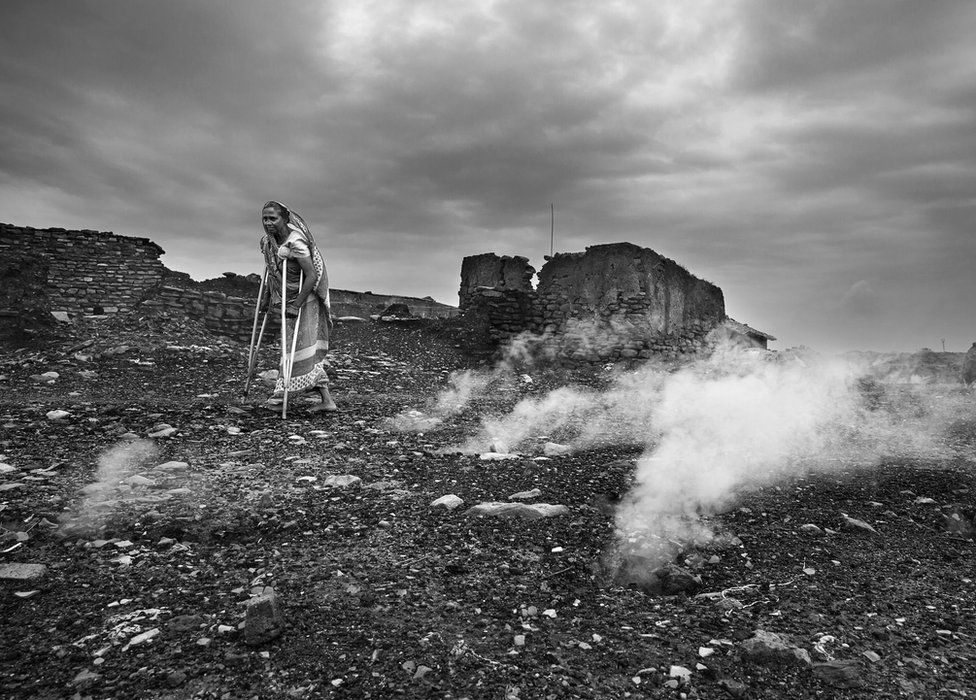 ASHA THADANI
ASHA THADANIIn the image above, a Dalit (formerly known as untouchable) woman worker limps past an open-cast coal mine in India’s Jharkhand state, where underground fires have burned for over a century.
The photograph is part of a black-and-white series titled “Broken” by Asha Thadani, who has been chronicling the lives of Dalits for seven years.
India’s 200 million Dalits find themselves among the nation’s most marginalised citizens, condemned to the lowest echelons of society by a rigid caste hierarchy.
Quotas in state institutions for Dalits have narrowed gaps in education, income and health. Dalits now boast a thriving chamber of commerce filled with millionaires. Many organisations actively champion their rights. Two Dalits have served as heads of state.
However, a significant number of Dalits continue to find themselves in occupations shunned by others, such as the disposal of dead animals and cleaning sewers.

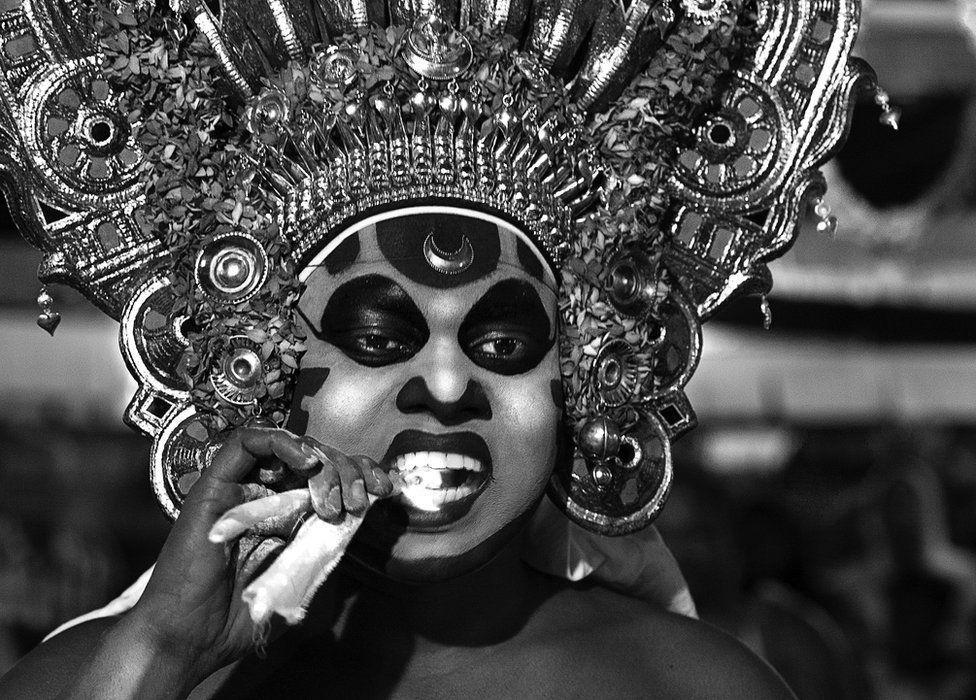
Theyyam is a religious ritual that originated in the northern part of Kerala.
Here is a Dalit theyyam performer from the state, where these dancers in trance are thought to embody the very divinities they venerate.
“When they become theyyam artistes they become story-teller and medium – living representations of the gods. Even though theyyam is rooted in the caste system, during the performance the upper castes must respect and obey this divine dancer who is of the lower caste,” says Ms Thadani.
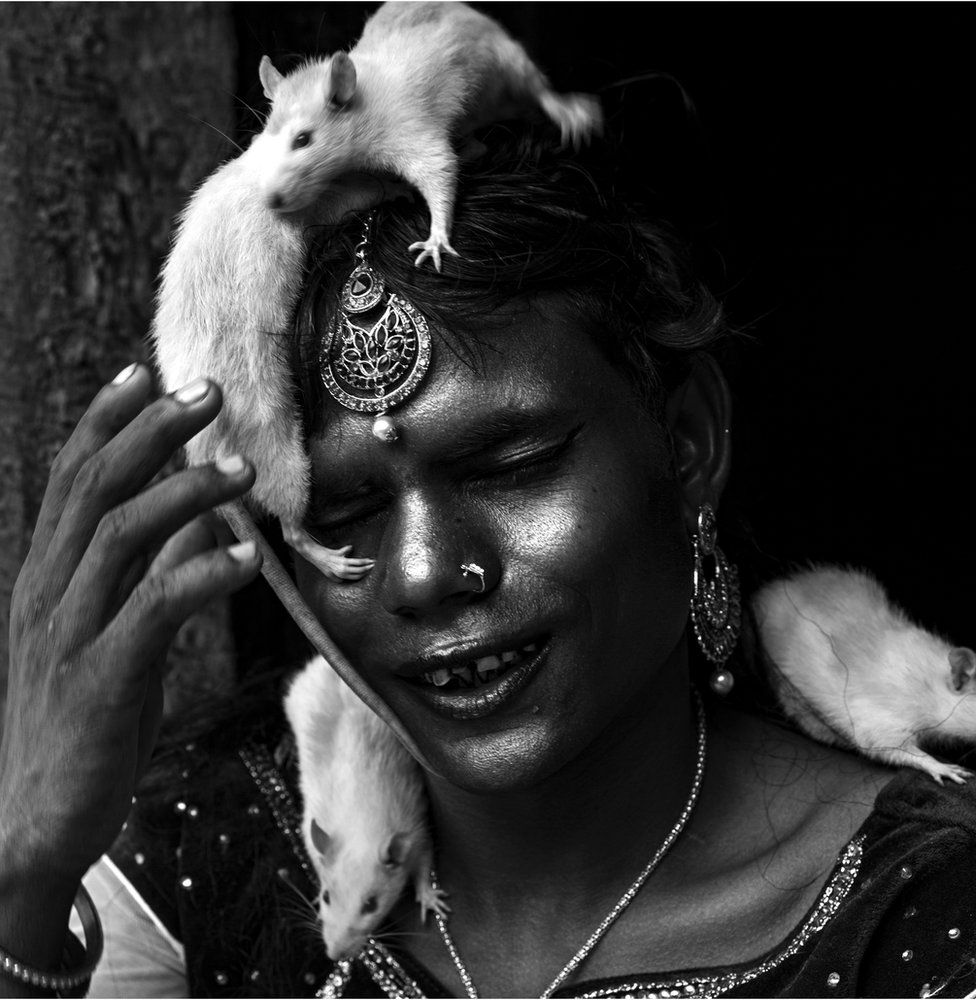
Musahars, which literally means ”rat people,” are so poor that their staple diet often comprises mice.
A Dalit community in Bihar state, the Musahars mostly work on the farms owned by landlords and go without work for up to eight months a year.
Facing the challenge of survival and dependent on the unpredictable generosity of landlords, the Musahars have found alternative livelihoods, such as the Nachaniya – a group of gender-fluid entertainers within their community.
These male entertainers, aged 10 to 23, dress as women and perform at village weddings, particularly during the monsoon season.
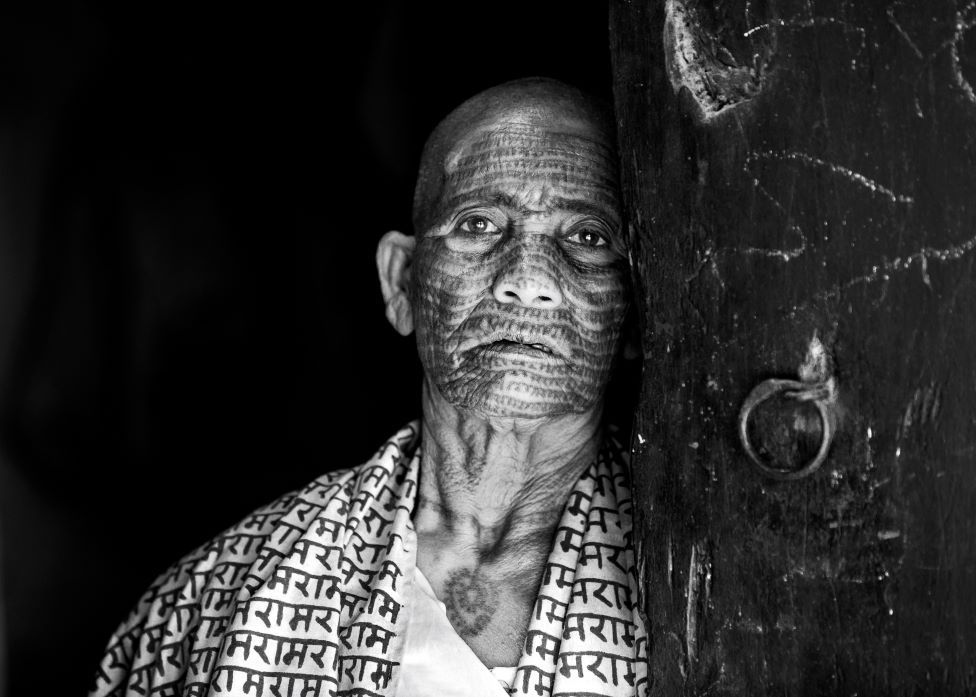
In a visual hymn to devotion, a Ramnami woman stands pensively at a doorway, her face and shaven head tattooed with the rhythmic repetition of “Ram” in Devanagari script, which is used to write Hindi – an eloquent manifestation of chant in written form.
With each stroke of the wooden needle, infused with ink derived from kerosene-lamp soot, intricate concentric circles and linear patterns emerge, fashioning a sacred tapestry on her skin. The tradition extends to a shawl, gracefully draped around her shoulders, bearing the sacred word.
Born from a late 19th-Century act of defiance, the Ramnamis of Chhattisgarh state embody a distinctive protest, etching visible devotion on both skin and soul – a timeless fusion of faith and identity.

Emerging from the sacred depths of the Ganges in the holy city of Varanasi, a skilled Dalit diver surfaces with coins clenched between his teeth – an evocative snapshot of a life intricately woven into the river’s narrative.
Known as a ‘Gotakhor’ or an expert diver, he holds the coins – offerings from seekers of absolution – between his teeth, leaving his hands free to navigate the river’s current.
The divers are also tasked with recovering the bodies of people who have drowned in the river and are compensated with cheap alcohol, according to Ms Thadani.
“Each dive is a ritual, and every coin retrieved serves as an offering to ease the symbolic journey across difficult waters,” she says.

In a corner of Bihar, these Dalit women resisted upper-caste restrictions on jewellery by developing a unique form of adornment – tattoos.
Using cow dung, bamboo, straw, twigs, and palm leaves to construct their huts, they transformed the walls into canvases.
“Forbidden from depicting Hindu deities, they found inspiration in nature. Today, their [style of] paintings are renowned, serving as a source of livelihood and a testament to the creativity and courage of these women,” says Ms Thadani.

These women are professional mourners, practicing the ancient Oppari mourning ritual deeply ingrained in a community of Dalits in Tamil Nadu.
Traditionally performed as a soulful response to the loss of close family members, Opparis are sung on behalf of or directly to the bereaved family.
These women are summoned to homes where death has occurred, expertly externalising grief in a profound ritual.
This task, deemed “polluting” and reserved for Dalits, challenges societal norms that associate the external display of grief with weakness, a perception traditionally confined to women.
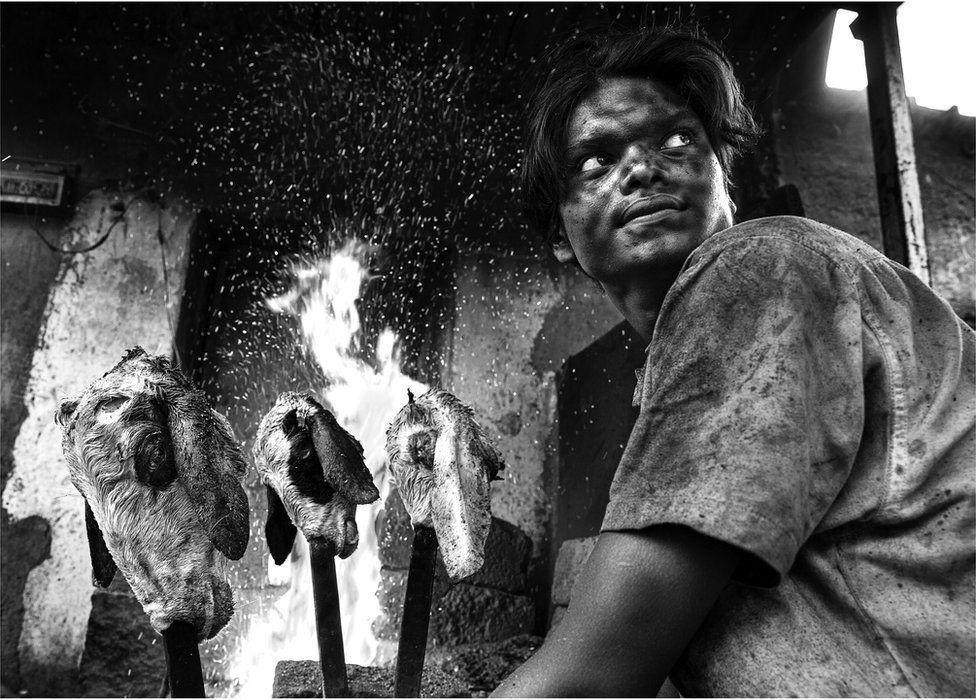
Shiva, from a community of Dalits in Karnataka, is part of a group that burns goat heads outside the meat market in Bangalore (Bengaluru) city .
Goat heads are fire-processed to remove the fur, making it easier to prepare and sell the most expensive organ – the brain. This process is a necessary step in the preparation of the meat.
Exposed to scorching heat, toxic smoke and coal dust daily, those doing this work have a life expectancy of 35 to 45 years. The metal skewers that are used become extremely hot during burning, affecting the sensitivity of their hands as they hold them throughout the working day.
This job is exclusively performed by Dalit males, some as young as 10 to 12 years old, who receive a payment of 15 rupees (18 cents) for processing a goat head.
BBC News India is now on YouTube. Click here to subscribe and watch our documentaries, explainers and features.

Read more India stories from the BBC:

Govt set to reveal benefits for recruits
PUBLISHED : 21 Dec 2023 at 05:32

The Ministry of Defence looks set to offer an array of benefits to new service members, including occupational and educational training opportunities, to attract recruits under the government’s new policy to fade out conscription and replace it with voluntary recruitment by 2028.
Starting Tuesday, those interested in joining the military’s three branches can submit their application online at https://rcm.rta.mi.th, said Jirayu Huangsap, spokesman for Defence Minister Sutin Klungsang.
A major event was also planned to take place in front of the Office of the Permanent Secretary for Defence in Nonthaburi from 10am until 9pm, to promote the ministry’s recruitment programme.
The event will highlight the benefits new service members will receive during their basic training and service with the military, as well as further educational opportunities after they leave, said the spokesman.
When all the benefits for a new generation of service members are revealed, people will forget their old perception of life in the armed forces under conscription, he said.
From next year onwards, new service members will receive a package of benefits, including a monthly salary and various occupational and educational training opportunities to choose from, he said.
The training period, which normally ranges from six months to two years, will never again be perceived as a waste of time, as many used to view it, he said.
“New recruits will have the opportunity to study for a bachelor’s degree to widen their opportunities to find a good job in the civil service after they leave,” Mr Jirayu said.
The ministry on Tuesday signed an agreement with the Ministry of Education and the Ministry of Higher Education Science Research and Innovation on the organising and certification of study programmes, he said.
The new recruitment programme is also part of the government’s defence development policy, which is required to be more in line with the government’s economic development, he said.
Rare vulture lays first egg
PUBLISHED : 21 Dec 2023 at 05:30

A rare red-headed vulture (Sarcogyps calvus) in Huay Kha Khaeng wildlife sanctuary in Uthai Thani has laid its first egg, marking a significant step in ongoing efforts to breed and reintroduce this critically endangered species to Thailand.
The news was shared on social media by Ornyupa Sangkamarn, secretary-general of the Sueb Nakhasathien Foundation, who said she was keeping her fingers crossed that the egg would be fertile and hatch.
According to Ms Ornyupa, the female red-headed vulture, named Ming, laid its egg on Sunday after mating on Nov 23.
The male vulture, named Pock, was in captivity in Korat Zoo before it was relocated to the wildlife sanctuary for the breeding and reintroduction programme.
It was the first time the two had mated since they were paired together at the breeding site in February last year. The news sparked excitement and hope among breeding programme participants.
The breeding programme is a five-year collaboration from October 2020-September 2025 between the Zoological Park Organisation (ZPO), the Department of National Parks, Wildlife and Plant Conservation (DNP), Kasetsart University and the Sueb Nakhasathien Foundation to breed and return the vultures to the wild. The last big flock of 35 red-headed vultures disappeared from the sanctuary in February 1992 after eating a poisoned deer carcass used by tiger hunters.
The red-headed vulture is a protected species in Thailand and is listed as nearly critically endangered by the International Union for Conservation of Nature (IUCN).
Venezuela: Americans freed in swap deal – and fraudster Fat Leonard returned
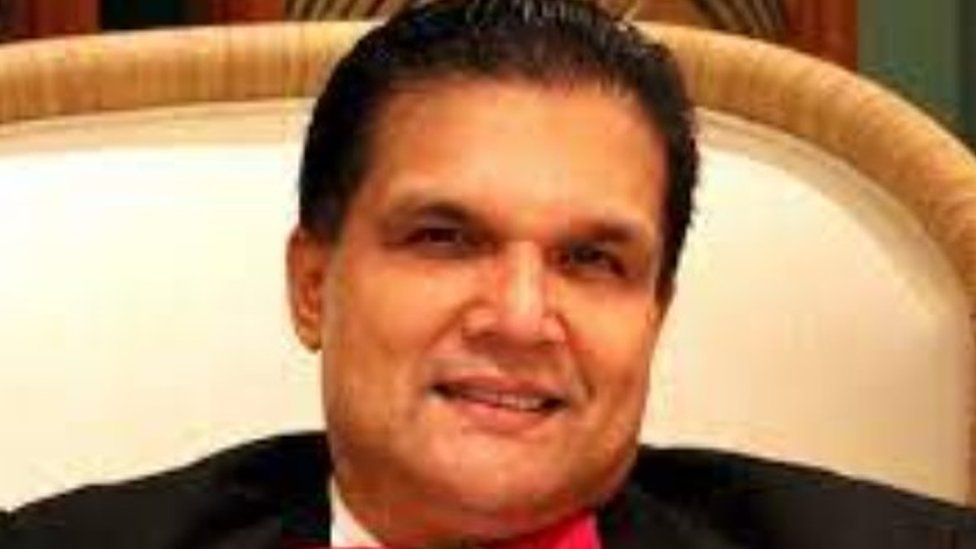 USMS San Diego
USMS San DiegoAn infamous fugitive billionaire – known as Fat Leonard – has been released as part of a prisoner swap with Venezuela, the White House has confirmed.
The fugitive, whose real name is Leonard Glenn Francis, masterminded a $35m (£30m) fraud against the US Navy. He escaped from US custody in 2022.
Ten US citizens held in Venezuela were released as part of the deal.
In exchange, the US released Alex Saab, an aide to Venezuela’s president.
Francis, the most high-profile prisoner involved in the deal, was detained in September 2022 trying to board a flight from Venezuela to Russia while on the run from US authorities.
The Malaysian businessman had escaped house arrest in California two weeks earlier, where he was being held after admitting to his role in a sprawling scam that cost the US tens of millions of dollars and implicated dozens of navy officers.
Prosecutors say he used his Singapore-based business – which had contracts to service US naval vessels – to defraud the US Navy, while also plying American officers with cash and gifts as bribes.
Court documents filed as part of his plea agreement accused Francis of giving US officials millions of dollars worth of gifts, which included lavish trips, “top-shelf alcohol and wine”, Spanish suckling pigs, Cuban cigars and access to prostitution services.
Francis was first arrested in 2013, and pleaded guilty to offering $500,000 (£444,000) in bribes in 2015.
In a statement, President Joe Biden said he will now be “sentenced for his lead role in a brazen bribery and corruption case”.
He said: “I am grateful that their ordeal is finally over, and that these families are being made whole once more.”
The swap deal will also see Mr Saab, a close aide of Venezuelan President Nicolás Maduro, returned.
He faced allegations of laundering money on behalf of the Maduro government, which he denied.
Mr Saab was extradited to the US in 2021 after being arrested during a stopover in Cape Verde.
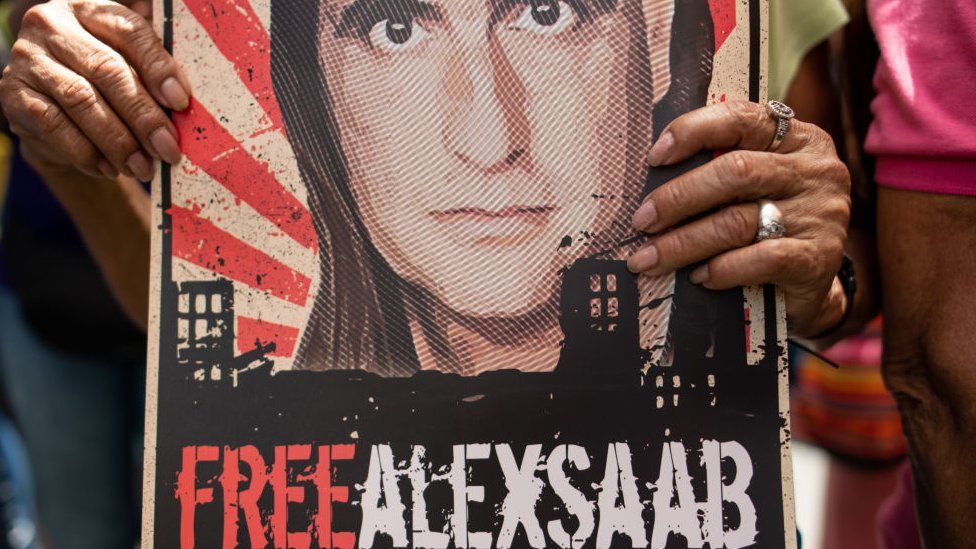
The Maduro government has long demanded the release of Mr Saab, whom it describes as a “diplomat”.
The Colombian-born businessman was on his way to Iran when he was detained on an Interpol “red notice” while his plane refuelled in Cape Verde in 2020.
The Venezuelan government described him as an “envoy” and argued that he had been travelling to Iran to buy medical supplies during the Covid-19 pandemic.
But Cape Verde ruled that he did not have diplomatic status and extradited him to the US, where he was charged with money laundering and bribery.
According to US prosecutors, Mr Saab siphoned off $350m (£276m) from Venezuelan government contracts by fraudulently using favourable exchange rates.
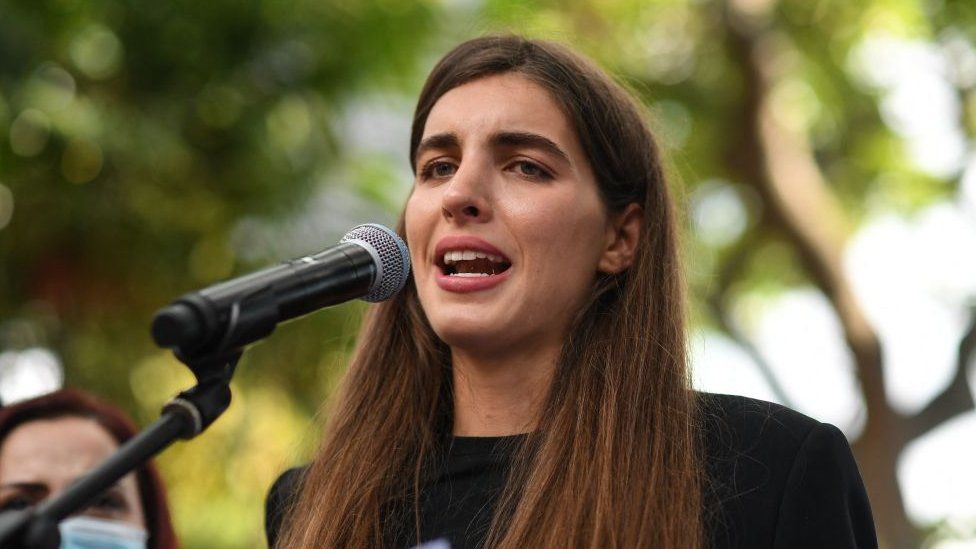
He then allegedly laundered the money in the US before finally transferring it to accounts controlled by him and his alleged associate.
The US treasury department has described Mr Saab as a “profiteer orchestrating a vast corruption network” that it says enabled “President Nicolás Maduro and his regime to significantly profit from food imports and distribution in Venezuela”.
Mr Saab has denied the charges and the Maduro government has stood by him, even walking out of US-backed talks with the Venezuelan opposition in protest at Mr Saab’s extradition in 2021.
The White House also said Joseph Cristella, Eyvin Hernandez, Jerrel Kenemore, and Savoi Wright were among those released.
It classes six of the 10 Americans released by Venezuela as having been “wrongfully detained”.
The White House also said Venezuela had agreed to release 20 Venezuelan political prisoners, as well as opposition figure Roberto Abdul, and had committed to suspending the arrest warrants of three other Venezuelans.
This is not the first prisoner swap the US and Venezuela have agreed.
In October 2022, Venezuela freed seven jailed US citizens in exchange for the release of two nephews of Mr Maduro’s wife.
Known as the “narco-nephews”, the two men had been serving 18-year sentences in the US for attempting to smuggle cocaine into the US.
Relations between the two countries eased further in October this year when the US agreed to loosen its sanctions on Venezuela in exchange for President Maduro agreeing to allow international observers to monitor next year’s presidential election.
But the US has since reiterated its demand that US citizens “wrongfully detained” in Venezuela be freed and threatened to reimpose sanctions if progress was not made on the issue.
Human rights groups in Venezuela have reacted to the news by demanding that the close to 300 people they list as political prisoners in Venezuelan jails also be freed.
Related Topics
-
-
17 October 2021
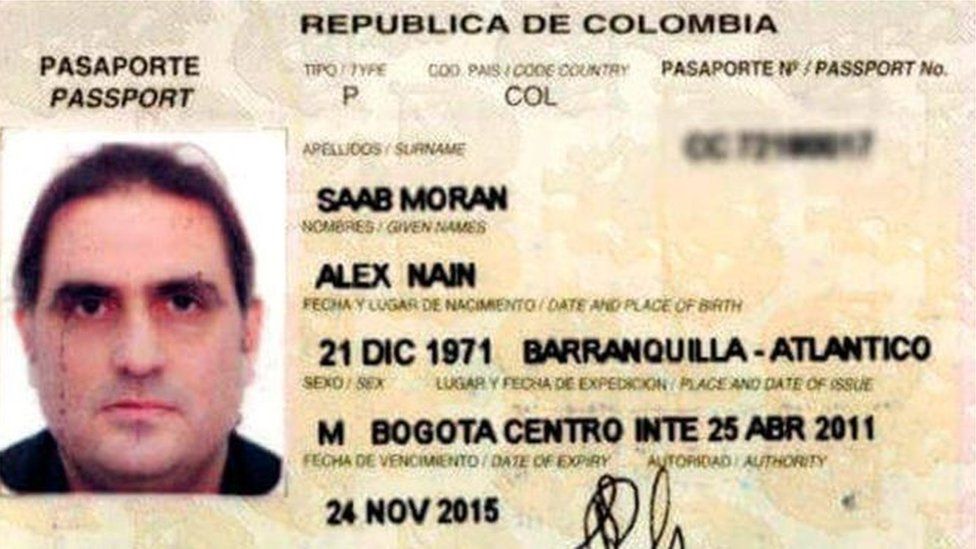
-
-
-
13 June 2020
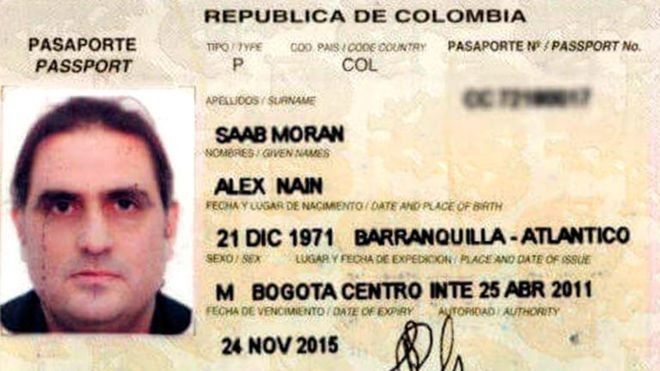
-
Heading into Johor Bahru? Top tips for crossing the Causeway
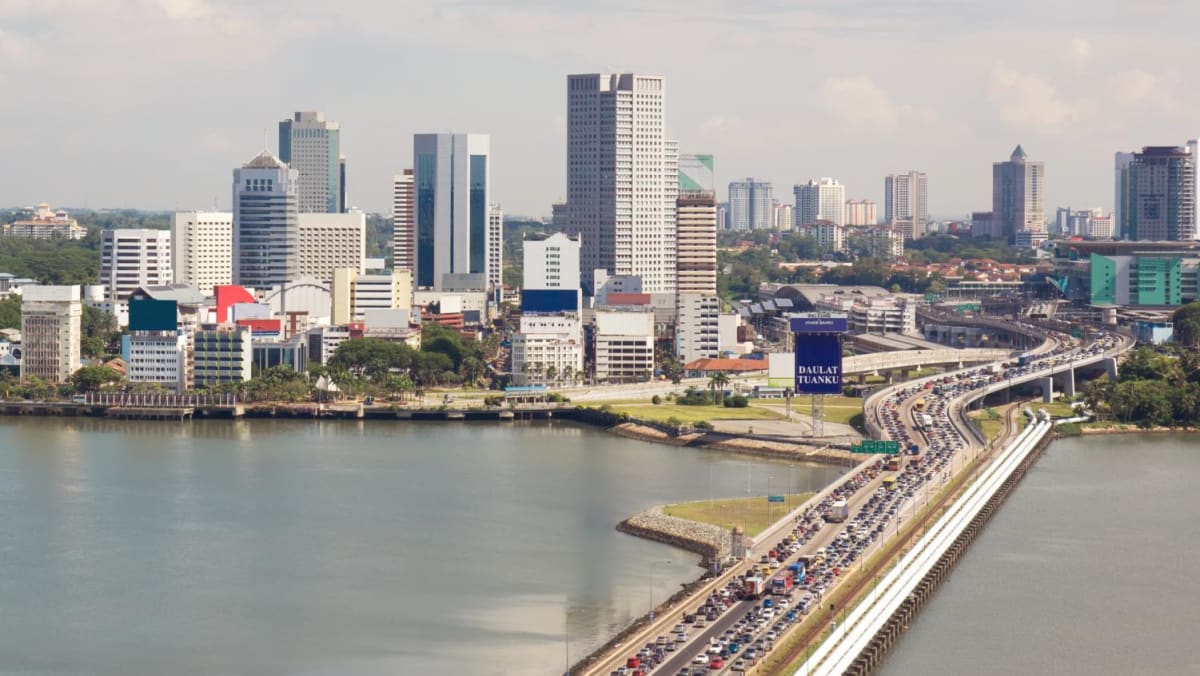
The current fare for a one-way ticket from Woodlands Checkpoint into Johor Bahru is RM17.80 (S$5) while it costs RM5 (S$1.40) to travel back to Singapore from the station in JB Sentral.
The train, also known as the Tebrau Shuttle, currently makes 31 trips daily – 18 from JB Sentral to Woodlands, and 13 from Woodlands to JB Sentral.
Just remember to arrive early. Gates close at Woodlands 20 minutes before departure while the gantries at JB Sentral shut 10 minutes before the train leaves.
Had a change in plans? Here’s a tip – you can cancel your ticket online for a partial refund.
Get a 75 per cent refund for cancellations made more than 72 hours before departure and 50 per cent for cancellations made within the three-day window.
The quickest way to handle payments is also via the platform’s KTM Wallet, which eliminates the need for multi-step security authentication when you are on the go.
BY BUS
Cross-border bus services are another pocket-friendly option – SBS Transit buses 160, 170 and 170X, as well as SMRT bus service 950.
Bus service 160 plies the route between Jurong Town Hall bus interchange and JB Sentral Bus Terminal.
Service 170 travels between Queen Street Terminal and Larkin Terminal in Johor Bahru, while 170X travels between Kranji MRT station and JB Sentral.
SMRT bus service 950 runs between Woodlands Temporary Bus Interchange and JB Sentral terminal.
More information on operating hours and arrival timings is available on the Land Transport Authority’s MyTransport.SG app or via the bus operators’ websites.
But if just crossing the Causeway is your main objective, any bus will do, including the bright yellow Causeway Link buses operated by Malaysia.







